

Fun facts about Clinton and Trump – Lesson Plan. Much of the media’s coverage of presidential candidates typically focuses on either the candidates’ policy stances or image.
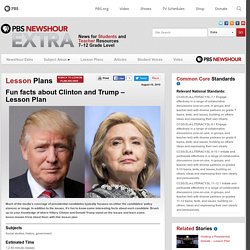
In addition to the issues, it’s fun to know some interesting facts about each candidate. Brush up on your knowledge of where Hillary Clinton and Donald Trump stand on the issues and learn some lesser-known trivia about them with this lesson plan. Subjects Social studies, history, government Estimated Time 1-2 50 minute classes Grade Level Activities: What Workers Crave More Than Money. For older workers, a pay raise is great.

But what many really, really want, in the words of The Spice Girls, is gratitude and acknowledgement of work well done. That’s what I’ve concluded after interviewing authors of two new books (leadership trainer Shola Richards’ Making Work Work and Duke University professor Dan Ariely’s Payoff: The Hidden Logic That Shapes Our Motivation, out next month) and Halogen Software global practice leader Anita Bowness as well as reading recent surveys. Their insights, I think, can be extraordinarily useful for older workers themselves and for the managers they work for. Lucy Kellaway: A blast of common sense frees staff from appraisals. Last week I did the most unexpectedly uplifting thing I’d done in ages.

What Do Millennials Really Want at Work? The Same Things the Rest of Us Do. Saturday Night Live recently featured a sketch poking fun at Millennials.

It opens with a young woman frantically texting on her iPhone, approaching her boss and asking for a promotion. The boss asks how long she’s been with the company. What Millennials Want from a New Job. Millennials, it seems, really are the job hoppers people say they are.

Those born between 1980 and 1996 are the most likely to look for and change jobs, according to Gallup’s new report “How Millennials Want to Work and Live.” Our research — which provides an in-depth look at what defines Millennials as employees, people, and consumers — both confirms and casts aside some of the myths about this particular generation. It paints a nuanced picture that can help inform companies looking to hire and retain Millennial employees — a group that is now the largest generation in the U.S. On the job-hopping question, we found that 21% of Millennial workers had left their job in the last year to do something else, a number that is more than three times higher than that of non-Millennials who report doing the same. Ft. Premium Digital All the benefits of a standard Digital Subscription plus:
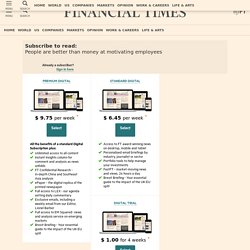
Lucy Kellaway: A blast of common sense frees staff from appraisals. Forbes Welcome. What Really Motivates Workers in Their 20s. As we all know, young workers are a contemptible bunch.

Lucy Kellaway: Six things that have driven workplace rudeness. Last Tuesday on my way to work I was waiting to cross a road when a middle-aged woman next to me dropped some coins on to the footpath.
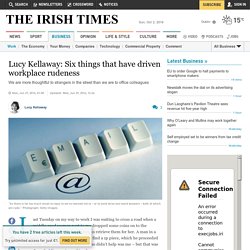
Six people bent down to retrieve them for her. A man in a smart navy suit fumbled in the gutter to find a 1p piece, which he proceeded to hand over. The only person nearby who didn’t help was me – but that was because I was holding on to my bicycle. People are better than money at motivating employees. Premium Digital All the benefits of a standard Digital Subscription plus: Unlimited access to all content Instant Insights column for comment and analysis as news unfolds FT Confidential Research - in-depth China and Southeast Asia analysis ePaper - the digital replica of the printed newspaper Full access to LEX - our agenda setting daily commentary Exclusive emails, including a weekly email from our Editor, Lionel Barber Full access to EM Squared- news and analysis service on emerging markets Brexit Briefing - Your essential guide to the impact of the UK-EU split Standard Digital Access to FT award winning news on desktop, mobile and tablet Personalised email briefings by industry, journalist or sector Portfolio tools to help manage your investments FastFT - market-moving news and views, 24 hours a day Brexit Briefing - Your essential guide to the impact of the UK-EU split Digital Trial For 4 weeks receive unlimited Premium digital access to the FT's trusted, award-winning business news.
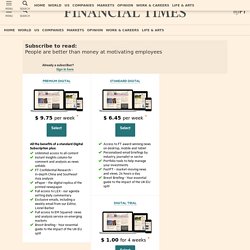
It's not the marketing message that counts - it's disrupting people's habits. Branding discussions often focus on positioning and market segments.
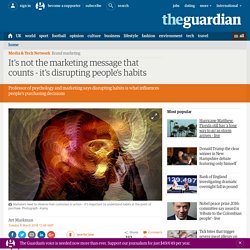
If a brand is not selling as well as it could, the assumption is that it must not be reaching its target audience with the right message. And if the team could only develop the right message, the brand would take off. In most cases, though, positioning does not matter much. The Ehrenberg-Bass Institute has examined purchase data from various product categories. As explained in the institute director Byron Sharp’s book, brands in a product category differ in their market share, but the pattern of sales within each market segment is about the same. If positioning isn’t driving sales, what is? Habits. If habits are so important, why aren’t they central to branding discussions? Part of the problem is that marketers still develop insights about their brands from asking consumers in focus groups and surveys.